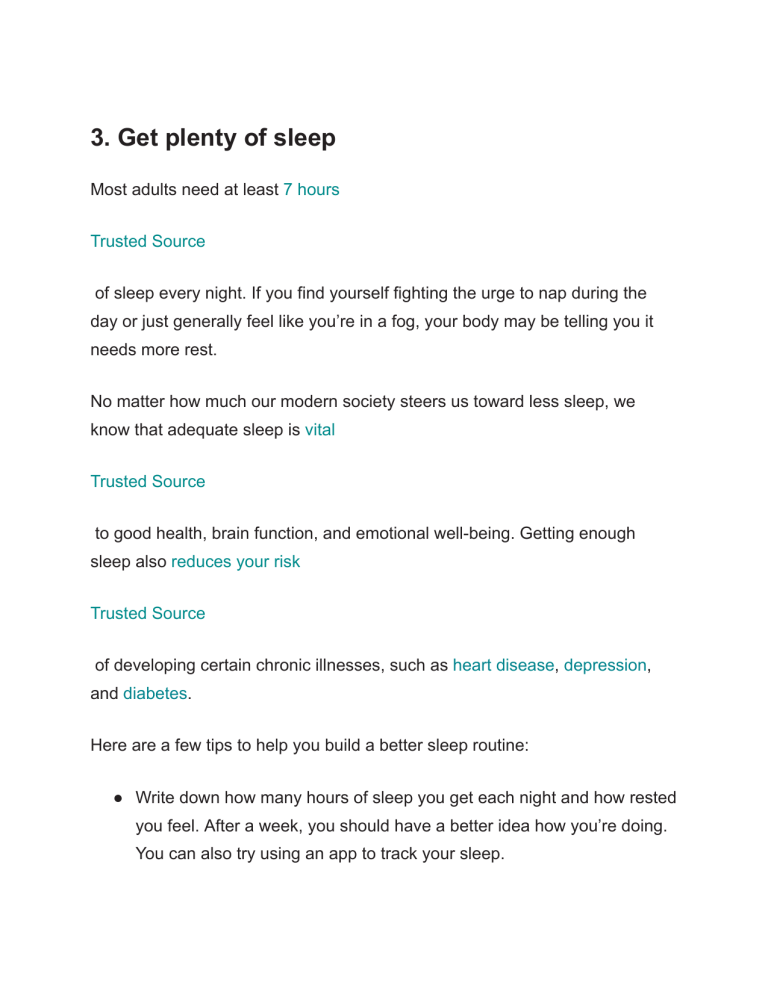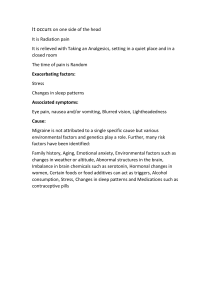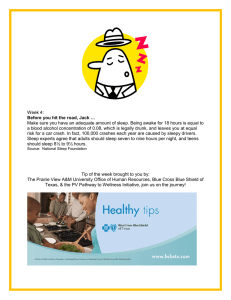
3. Get plenty of sleep Most adults need at least 7 hours Trusted Source of sleep every night. If you find yourself fighting the urge to nap during the day or just generally feel like you’re in a fog, your body may be telling you it needs more rest. No matter how much our modern society steers us toward less sleep, we know that adequate sleep is vital Trusted Source to good health, brain function, and emotional well-being. Getting enough sleep also reduces your risk Trusted Source of developing certain chronic illnesses, such as heart disease, depression, and diabetes. Here are a few tips to help you build a better sleep routine: ● Write down how many hours of sleep you get each night and how rested you feel. After a week, you should have a better idea how you’re doing. You can also try using an app to track your sleep. ● Go to bed and wake up at the same time every day, including on weekends. ● Reserve the hour before bed as quiet time. Take a bath, read, or do something relaxing. Avoid heavy eating and drinking. ● Keep your bedroom dark, cool, and quiet. ● Invest in some good bedding. ● If you have to take a nap, try limiting it to 20 minutes. If you consistently have problems sleeping, consider talking with a doctor. You may have a sleep disorder that requires treatment. 4. Eat with mood in mind You may already know that your food choices have an impact on your overall physical health. But some foods can also affect your state of mind. Trusted Source For example: ● Carbohydrates release serotonin, a “feel good” hormone. Just keep simple carbs — foods high in sugar and starch — to a minimum because that energy surge is short and you’ll crash. Choosing complex carbs, such as vegetables, beans, and whole grains, can help you avoid a crash while still providing serotonin. ● Lean meat, poultry, legumes, and dairy are high in protein. Protein-rich foods release dopamine and norepinephrine, which boost energy and concentration. ● Omega-3 fatty acids, such as those found in fatty fish, have been found to have anti-inflammatory effects ● Trusted Source ● that extend to your overall brain health. If you don’t eat fish, you might consider talking with a doctor about possible supplementation. ● Highly processed or deep-fried foods tend to leave you feeling down and so will skipping meals. If you want to eat with your mood in mind, consider starting with making one food choice for your mood each day. For example, swap a big, sweet breakfast pastry for some Greek yogurt with fruit. You’ll still satisfy your sweet tooth, and the protein will help you avoid a midmorning energy crash. Consider adding in a new food swap each week.





